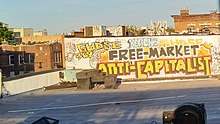
Back أناركية السوق الحرة Arabic Tržní anarchismus Czech Market anarchism English Libermerkata anarkiismo Esperanto آنارشیسم بازار آزاد Persian Markkina-anarkismi Finnish Piaci anarchizmus Hungarian 自由市場無政府主義 Japanese საბაზრო ანარქიზმი Georgian Рыночный анархизм Russian

L'anarchismo di mercato,[1] noto anche come anarchismo di libero mercato e anticapitalismo di libero mercato,[2] è una corrente dell'anarchismo che sostiene un sistema economico di libero mercato basato su interazioni volontarie senza il coinvolgimento dello Stato. Una forma di anarchismo individuale[3] e socialismo libertario,[4] si basa sulle teorie economiche del mutualismo e dell'anarchismo individualista negli Stati Uniti.[2]
L'agorismo di Samuel Edward Konkin III è un filone dell'anarchismo di mercato di sinistra che è stato associato al libertarismo di sinistra.[5] L’anarcocapitalismo, più legato a istanze di destra e liberali classiche, sviluppato dall'economista americano Murray Rothbard, è considerato un sinonimo di anarchismo di libero mercato[6][7][8][9].
- ^ Roderick T. Long, Left-Libertarianism, Market Anarchism, Class Conflict and Historical Theories of Distributive Justice, in Griffith Law Review, vol. 21, n. 2, 1º gennaio 2012, pp. 413–431, DOI:10.1080/10383441.2012.10854747.
- ^ a b theamericanconservative.com, ISSN 1540-966X, https://www.theamericanconservative.com/libertarian-left/. URL consultato il 1º febbraio 2023.
- ^ Chartier, Gary; Johnson, Charles W. (2011). Markets Not Capitalism: Individualist Anarchism Against Bosses, Inequality, Corporate Power, and Structural Poverty. Brooklyn: Minor Compositions/Autonomedia.
- ^ Carson, Kevin. "Socialism: A Perfectly Good Word Rehabilitated". Center for a Stateless Society. "But there has always been a market-oriented strand of libertarian socialism that emphasizes voluntary cooperation between producers. And markets, properly understood, have always been about cooperation. As a commenter at Reason magazine's Hit&Run blog, remarking on Jesse Walker's link to the Kelly article, put it: "every trade is a cooperative act." In fact, it's a fairly common observation among market anarchists that genuinely free markets have the most legitimate claim to the label "socialism."
- ^ "Anarchism". In Gaus, Gerald F.; D'Agostino, Fred, eds. (2012). The Routledge Companion to Social and Political Philosophy. p. 227. "Later [left-libertarianism] became a term for the left or Konkinite wing of the free-market libertarian movement, and has since come to cover a range of pro-market but anti-capitalist positions, mostly individualist anarchist, including agorism and mutualism, often with an implication of sympathies (such as for radical feminism or the labor movement) not usually shared by anarcho-capitalists."
- ^ James G. Carrier, Meanings of the Market: The Free Market in Western Culture, 1ª ed., Berg, 1997, p. 107, ISBN 1-85973-149-X.
- ^ Miller, G. Tyler; Paul, Ellen Frankel; Miller Jr., Fred D., eds. (1993). Liberalism and the Economic Order, Part 2. p. 115.
- ^ Long, Roderick T.; Machan, Tibor R. (2016) [2008]. Anarchism/Minarchism: Is a Government Part of a Free Country?. Ashgate.
- ^ Hoffman, John; Graham, Paul (2006). Introduction to Political Theory. p. 243.